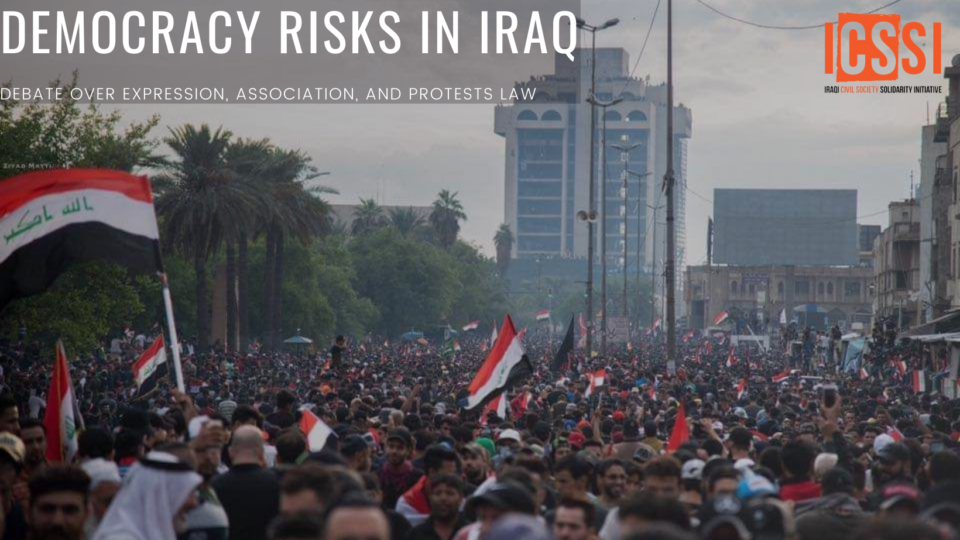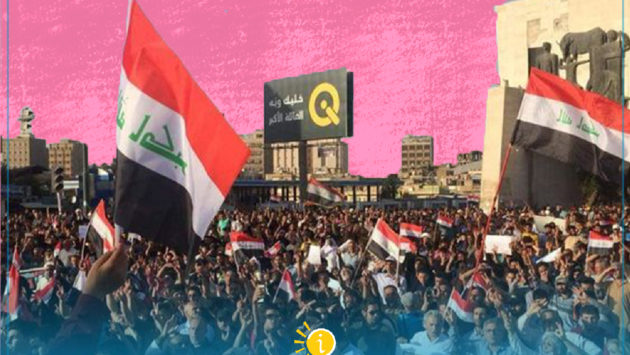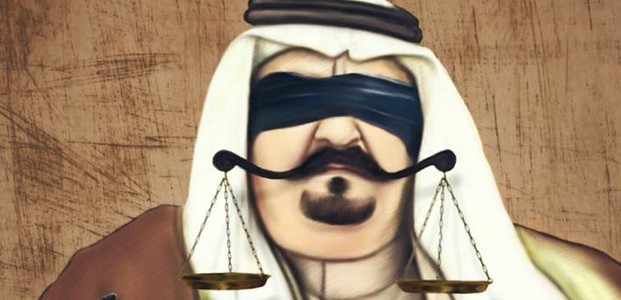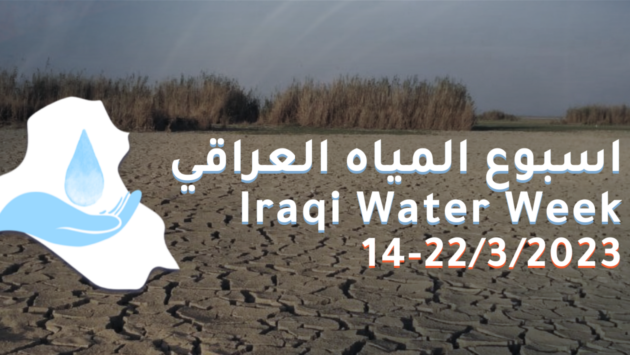The draft law on freedom of expression, assembly, and peaceful protest threatens to further restrict constitutionally guaranteed democratic rights in Iraq.
The Iraqi parliament reintroduced the draft law for discussion in March 2023. It is unclear which version the parliament is currently considering, with different versions of the draft law circulating on social media. The discussion in the Iraqi parliament is based on the draft law which was presented in 2011 – consisting of 17 articles (referred to as the 2011 draft law). The version recently presented by the government (referred to as the 2023 draft law), which has already been read twice, consists of only 14 articles and it’s considered as an amended version of the original draft law.
The 2011 draft law has faced numerous objections as it threatens the freedoms of expression, assembly, and protest guaranteed by the Iraqi constitution, and imposes arbitrary restrictions that violate international standards regulating those rights, including the International Covenant on Civil and Political Rights of 1966 and the Universal Declaration of Human Rights. Several international and Iraqi organizations such as the Press Freedom Organization issued statements and analyses of the draft law, highlighting the shortcomings and dangers to democratic freedoms. Protests from civil society organizations and bodies against the restrictions contained in the 2011 draft have kept the law at bay since it was proposed 12 years ago.
We are concerned that both drafts deal with general and unclear definitions and formulations, leaving its provisions wide open to abuse. For example, Article 1, Paragraph 4 of the 2011 draft, which is also Article 1, Paragraph 4 of the 2023 draft, states that: ‘General Assembly: is a meeting held in a public or private place where attendance is available to everyone.’ This is a very broad definition that includes multiple and different types of meetings. For example, what about public meetings that are not available to everyone? Such as a meeting of members of a network of civil society organizations, which is a specific meeting for members of that network? What about meetings between a specific number of organizations, unions, federations, volunteer groups, and even political parties, which are limited to a certain number of invitees?
The draft law also imposes requirements for holding a public meeting, regardless of its type. For ex-ample, Article 7-1 of the 2011 draft states that “citizens have the freedom to hold public meetings after obtaining prior permission from the head of the administrative unit at least (5) days in advance, provided that the request for permission includes the subject of the meeting, its purpose, time and place, and the names of the organizing committee members.” This article violates people’s right to assembly, as their right to gather is subject to the approval of individuals who have no connection to the subject or purpose of the meeting. Article 9-1 of the 2011 draft, which is the same as Article 8-1 of the 2023 draft, also states that “holding meetings or peaceful demonstrations in places of worship, schools and universities, or government departments must specify the topics of these meetings according to what has been designated for these places.” It is not clear who will determine this or how meetings related to workers’ rights, students, the right to work or education, and other issues that may require meetings in these places will be classified.
Additionally, the 2011 draft specifies penalties of imprisonment of up to 10 years, and ties them to general and vague provisions. Article 12 of the 2011 draft states that “restrictions on freedoms and rights provided for in this law shall not be imposed except in accordance with the requirements of public interest or what harms public order or public morals.” This article opens the door for authorities to impose restrictions even beyond the scope of this limited law, based on loose phrases, as there is nothing to specify requirements of public interest or what harms public order or public morals.
We would like to note that this law restricts more than one right. In addition to the right to assembly emphasized in this statement, it also threatens the right to access information, the right to freedom of expression, and the right to peaceful protest.
All of the above-mentioned restrictions, as we understand it, constitute a violation of the essence of the rights guaranteed by the Iraqi Constitution in Article (36), which states the following: ‘The state guarantees, in a manner that does not violate public order and morals: First: Freedom of expression by all means. Second: Freedom of the press, printing, advertising, media, and publishing. Third: Freedom of peaceful assembly and demonstration, regulated by law.
We understand the phrase ‘regulated by law’ as an indication that the need for regulation of the right should not infringe upon the essence of the right itself, which should be guaranteed by the state. This is also related to the international obligations of Iraq, which emphasize the importance of respecting these rights, along with the interpretations, concepts, and international standards
The 2011 and 2023 draft laws do not explicitly declare Iraq’s commitment to the concept of the right to assembly, as stated in the Universal Declaration of Human Rights – Article 20(1): “Everyone has the right to freedom of peaceful assembly and association.”. Similarly, Article 21 of the International Covenant on Civil and Political Rights, which Iraq has ratified, explicitly states “The right of peaceful assembly shall be recognized. No restrictions may be placed on the exercise of this right other than those imposed in conformity with the law and which are necessary in a democratic society in the interests of national security or public safety, public order, the protection of public health or morals or the protection of the rights and freedoms of others”, while Article 22 states “1. Everyone shall have the right to freedom of association with others, including the right to form and join trade unions for the protection of his interests.” “2. No restrictions may be placed on the exercise of this right other than those which are prescribed by law and which are necessary in a democratic society in the interests of national security or public safety, public order, the protection of public health or morals or the protection of the rights and freedoms of others.” Our group also expresses concern that this legislation threatens the human right to freely express opinions and receive information and ideas without unlawful interference or restrictions by the state or private entities.
The Permanent Working Group on Confronting the Shrinking of Civil Society Space in Iraq strongly condemns the increasing trend of restricting the working space of civil society organizations, and warns that legislations such as the one discussed in this statement threaten to further limit the right of assembly and protest, which is inherently vested in the people and guaranteed by international law. We believe that remaining without a law is a better option than passing a law that violates freedoms and contradicts Iraq’s international commitments.
If there is a decision to pass a law, we demand a real opportunity for independent civil society experts to meaningfully participate in the discussions and for relevant international organizations such as the UN Mission’s Human Rights Office to be involved. We also call for any new legislation to explicitly refer to international standards and commit to upholding them, to avoid interpretations that may restrict rights rather than regulate them.
We urge Iraqi and international actors to help us convey this viewpoint to their governments, the Iraqi government, and the Iraqi parliament. We call on the international community to stand in solidarity with us to protect and uphold human rights and freedoms.
About the Permanent Working Group to Confront the Shrinking Space of Civil Society in Iraq.
Enquiries: Please write to the following email: masaha.iq@protonmail.com




